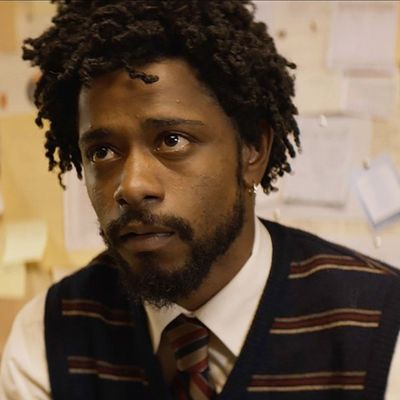
This review originally ran during the Sundance Film Festival.
The film industry loves to indulge actors who get the directing bug, for better or worse — you can look at this year’s (or any other) Sundance lineup for proof of that. Sorry to Bother You makes me wish that more musicians did. I’m not sure very many of the resulting films would look like Boots Riley’s rambunctious, surreal comedy, but you can feel the difference in a film whose director is listening to it with the same attentiveness that he’s watching it. While the front man of the Oakland funk-punk-soul collective the Coup has plenty of off-kilter visual ideas to serve up in his feature film debut, he always makes sure to keep our ears just as entertained.
Sorry to Bother You is a house party of a movie, some rooms more lively than others, some you wish you could spend more time in, some downright unforgettable in the best way. I cringe writing that, because “party movie” can be code for “jumbled, juvenile, mess,” but what I was most pleasantly surprised by is its focus. Those who have seen the film during its Sundance premiere may think I’m crazy for that, but when you think of the tradition Riley is working in — punk cinema in the universe of films like Repo Man or the cult oddity Blood Diner, it could have lost the plot a lot more easily. A pro-union, anti-corporate, race-conscious, Silicon Valley side-eyeing tale of one man’s journey through the late-capitalist nightmare of an “alternate present” version of Oakland, Sorry to Bother You’s greatest asset is the strength of its conviction, and how far it’s willing to go to make sure it stays burned in your brain.
Lakeith Stanfield, in peak anime-character mode, is Cassius Green, a flailing millennial living in his uncle’s (Terry Crews) garage with his artist-activist girlfriend Detroit (a luminous, pink-haired Tessa Thompson). At the film’s opening he’s interviewing for a job at a telemarketing firm, which he gets because it’s the one job in town that will hire literally everyone. He struggles with it at first, and Riley hilariously physically plops him in the homes of the people he’s calling, making the intrusiveness of marketing a physical thing. But when an older co-worker helps him tap into his hidden “white voice” — a Steve Buscemi-esque, nasal “yes-indeedy” patter that Cassius discovers he’s a natural at — he soon skyrockets up to MVP status at the company. It’s there that he realizes that he’s working for WorryFree, an indentured-slave-labor manufacturing firm disguised as a “disruptive” lifestyle colony, whose coke-hoovering CEO Steve Lift (Armie Hammer as a turbo-Winklevoss) represents everything Detroit and Cassius’s rapidly unionizing co-workers (led by a charming Steven Yeun) despise.
This is ultraprogressive, radical storytelling that manages to stay totally joyful and inventive throughout. Riley manages to both never come off as taking the thing too seriously, but he also verbalizes his intersectional, anti-capitalist ideals in visually unforgettable fashion. The soundtrack by Tune-Yards’ Merrill Garbus is organic and twitchy, as is the music by Riley’s own band. There is a cohesiveness that dares to add a new element at every turn, whether that element be a ridiculous Silicon Valley mansion orgy or a secret race of giant-cocked horsepeople. Every successive movement has rhythmic and visual drive, even if it feels like it might be driving off a cliff.
Sorry to Bother You goes on a bit longer than it probably should, and a few running jokes overstay their welcome. But this is what I want out of revolution-minded cinema in 2018 — something loud, inventive, and absolutely impolite. Throughout the film, Thompson sports a series of enormous laser-cut earrings with a series of escalating confrontational messages (“Murder Murder Murder, Kill Kill Kill”); in any other film, the ridiculousness of the accessory would overshadow the character. But Riley’s debut stays human no matter how far off the deep end it goes. If anything, it suggests that to be human is to go off the deep end.

